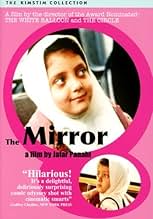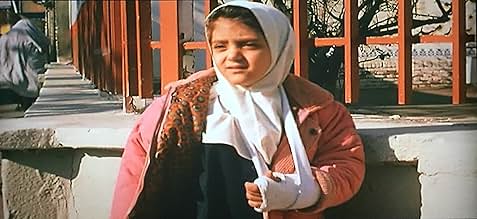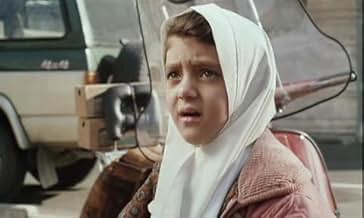VALUTAZIONE IMDb
7,5/10
3371
LA TUA VALUTAZIONE
Aggiungi una trama nella tua linguaWhen a young girl becomes lost in the hustle and bustle of Tehran, her journey turns into a dazzling exercise on the nature of film itself.When a young girl becomes lost in the hustle and bustle of Tehran, her journey turns into a dazzling exercise on the nature of film itself.When a young girl becomes lost in the hustle and bustle of Tehran, her journey turns into a dazzling exercise on the nature of film itself.
- Premi
- 4 vittorie e 1 candidatura in totale
Recensioni in evidenza
10Red-125
Ayneh (The Mirror) is an unusual, interesting, and compelling work. The young star, Mina, is type-cast as a forceful and self-reliant young girl. The city of Teheran, as portrayed, has an almost anarchic quality to its vehicle and pedestrian traffic rules. The constant threat of accident adds a real edge to this cinema verité film. (In fact, the only problem I had with this movie was the ethical concern of allowing any actor, especially a young girl, anywhere near all this traffic.)
The Mirror is an excellent choice if you are looking for a noisy, exciting portrayal of an individual caught up in a realistic urban setting. Not a soothing film, but in my opinion, a great one.
The Mirror is an excellent choice if you are looking for a noisy, exciting portrayal of an individual caught up in a realistic urban setting. Not a soothing film, but in my opinion, a great one.
This is a pure concept: Director has chosen to play with two resources: camera and sound. No music, no SFX.
The story itself is quite surprising.
Sometimes, the lower the budget, the greater the creativity. The border between documentary and film is blurred, so the sense of "reality" is quite present and remains till the end.
The director also plays with the audience: there is a certain point when the viewer feels to be misplaced.
As Rene Magritte's painting "la Vengeance", in which the artist does not accept the inherent limitations of his art, he dares to paint outside the easel, that way Jafar Panahi goes beyond the usual simple structure of the movies.
Just for "independent advanced" movie goers.
9/10
The story itself is quite surprising.
Sometimes, the lower the budget, the greater the creativity. The border between documentary and film is blurred, so the sense of "reality" is quite present and remains till the end.
The director also plays with the audience: there is a certain point when the viewer feels to be misplaced.
As Rene Magritte's painting "la Vengeance", in which the artist does not accept the inherent limitations of his art, he dares to paint outside the easel, that way Jafar Panahi goes beyond the usual simple structure of the movies.
Just for "independent advanced" movie goers.
9/10
Although this is no Hollywood, but just like another day in LA the poor director is having trouble with his temperamental star, save by quick thinking he somehow has turn this film into (perhaps) a far more interesting movie then he has intended.
Little Mina is a good actress, if not a very professional one, but one should consider that she is only in second year of her primary school and she has plenty of character to make up for it.
The film follows the day of Mina, and how she was trying to find her way home which mirrors the story of the film she no longer wants to take part in. The film lets us see the world from a little girl's point of view, hear her thoughts... it's a little reminder of how it was when we were little... being a child is not easy... no one wants to take you seriously, it takea you twice the time just to dial at a payphone, you don't remember those funny names grown up call those road.
It is a very interesting film, perhaps slow at first, but it will certainly make you laughs, make you think.
Little Mina is a good actress, if not a very professional one, but one should consider that she is only in second year of her primary school and she has plenty of character to make up for it.
The film follows the day of Mina, and how she was trying to find her way home which mirrors the story of the film she no longer wants to take part in. The film lets us see the world from a little girl's point of view, hear her thoughts... it's a little reminder of how it was when we were little... being a child is not easy... no one wants to take you seriously, it takea you twice the time just to dial at a payphone, you don't remember those funny names grown up call those road.
It is a very interesting film, perhaps slow at first, but it will certainly make you laughs, make you think.
This is a film about a girl going home. Apparently her mother failed to pick our little heroine up, and the feisty second grader sets out to find her way through the asphalt jungle all by herself. Well, there's more to it of course. It's the asphalt jungle of Tehran and the film was directed by Jafar Panahi, one of the innovative film makers of the Iranian New Wave. Not that his latest works are allowed to be shown in his home country, mind you. Sentenced to a six-year jail term in 2010 and banned from directing he nevertheless defiantly made an iPhone production called "This Is Not a Film" about his situation and managed to smuggle it out of Iran and tell the world.
The Iranian situation as such is already portrayed firsthand in Panahi's early 1997 film. A representative of the next generation, a child, in the center, we witness its abandonment by the adults. We eavesdrop on them complaining, but not really listening, observe the gender segregation on public transport (albeit through an innocent perspective in between as the missing link), but in a sea of scarves, uniform looks and the all encompassing everyday turmoil one can barely get a glimpse of something one could call "individuality"... In the words of Panahi: Everyone is wearing a mask, plays a role. Thanks to the stark realism present in Iranian movies we become part of the life and the hustle and bustle therein, get sucked in by following the odyssey through a child's eye. And we'll reach a point in the film where a clever twist cranks it all even up a notch. Thus a very real situation turns even more real and it results in a powerful reflection with a double meaning, within the film and outside of it. As in his preceding picture "The White Balloon", also centering on a cast of children, the tone in Panahi's "The Mirror" is light, and the film is entertaining throughout, yet layered and thought-provoking. There's someone who stands up to find a way, lost, but determined, wandering around in need for directions. But there's a fundamental difference between directions and direction, as the viewer might notice. No coincidence either that this someone we're talking about is a girl, the focus of some of Panahi's other works. Or let's say it that way: This is not a film... about a girl going home.
The Iranian situation as such is already portrayed firsthand in Panahi's early 1997 film. A representative of the next generation, a child, in the center, we witness its abandonment by the adults. We eavesdrop on them complaining, but not really listening, observe the gender segregation on public transport (albeit through an innocent perspective in between as the missing link), but in a sea of scarves, uniform looks and the all encompassing everyday turmoil one can barely get a glimpse of something one could call "individuality"... In the words of Panahi: Everyone is wearing a mask, plays a role. Thanks to the stark realism present in Iranian movies we become part of the life and the hustle and bustle therein, get sucked in by following the odyssey through a child's eye. And we'll reach a point in the film where a clever twist cranks it all even up a notch. Thus a very real situation turns even more real and it results in a powerful reflection with a double meaning, within the film and outside of it. As in his preceding picture "The White Balloon", also centering on a cast of children, the tone in Panahi's "The Mirror" is light, and the film is entertaining throughout, yet layered and thought-provoking. There's someone who stands up to find a way, lost, but determined, wandering around in need for directions. But there's a fundamental difference between directions and direction, as the viewer might notice. No coincidence either that this someone we're talking about is a girl, the focus of some of Panahi's other works. Or let's say it that way: This is not a film... about a girl going home.
Monsieur Panahi cannot resist a bit of metafiction. In this case the metafiction becomes the subject of the second part of the movie, as his lead child actress finds herself in the exact same predicament as the girl she was playing, running through the streets of Tehran, talking to all sorts of people, trying to get home. Only it starts to feel a little too gimmicky and I lost interest. Plus the fact that they were watching her from a distance, but still I couldn't help but feel they were endangering her.
Anyway, Tehran traffic is hellish and I'd be scared as an adult, let alone a child. But this kid just cannot sit still to save her life. It's true we would not have a movie otherwise, but basically stay in the playground and wait for your mother to come pick you up.
Anyway, Tehran traffic is hellish and I'd be scared as an adult, let alone a child. But this kid just cannot sit still to save her life. It's true we would not have a movie otherwise, but basically stay in the playground and wait for your mother to come pick you up.
Lo sapevi?
- QuizThe film stars Mina Mohammadkhani, the sister of Aida Mohammadkhani (The White Balloon).
- ConnessioniFeatured in In film nist (2011)
I più visti
Accedi per valutare e creare un elenco di titoli salvati per ottenere consigli personalizzati
- How long is The Mirror?Powered by Alexa
Dettagli
- Data di uscita
- Paese di origine
- Sito ufficiale
- Lingua
- Celebre anche come
- The Mirror
- Luoghi delle riprese
- Azienda produttrice
- Vedi altri crediti dell’azienda su IMDbPro
Botteghino
- Lordo Stati Uniti e Canada
- 69.915 USD
- Lordo in tutto il mondo
- 69.915 USD
Contribuisci a questa pagina
Suggerisci una modifica o aggiungi i contenuti mancanti




